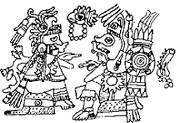
The role of the book, the map, and other European notions of literacy in the conquest of the New World.
This book contrasts Amerindian and European writing systems, and explores the implications of those differences in history-writing as a means of controlling the past, and map-making as a means of controlling space. Part I, "The Colonization of Language," discusses the development of Spanish grammar, the "Dialogue of 1524" between mendicant friars and Aztec lords, and different understandings of the book as object and text. Part II, "The Colonization of Memory," analyzes European and Amerindian narratives, and examines the work of Bernardino de Sahagún, often seen as a forerunner of modern anthropology. "The Colonization of Space," the last section, shifts from literature to maps, analyzing both linguistic descriptions and mapping techniques in relation to the construction of territoriality and understandings of cultural space.
The Darker Side of the Renaissance: Literacy, Territoriality, and Colonization will significantly challenge our understanding of New World history. It will challenge and stimulate Renaissance and New World scholarship, speak to debates in current anthropology, augment our understanding of linguistics, and provide models for colonial and post-colonial scholarship.
"I was tremendously impressed by the scope of this book. It will be important both for colonialists and modernists, and will find readers among the social scientists."
---Roberto González Echevarría, Yale University
"Semiotic in the most fascinating way, for Mignolo is analyzing the creation of sign systems and the imposition of hegemonic authority on native American sign systems. The book should change the way we look at the colonization of the New World."
---Michael Palencia-Roth, University of Illinois
"A major contribution to colonial studies that not only challenges, implicitly, the traditional academic boundaries known as Spanish Golden Age and Spanish American colonial literature, but also has wide implications for colonial studies in other disciplines."
---Nicholas Spadaccini, University of Minnesota
Walter D. Mignolo is Professor in the Department of Romance Studies and the Program in Literature, Duke University.
Return to New Books subject areas
6 x 9, ca 400 pages, 100 illustrationsISBN 0-472-10327-X
cloth 39.50E (tentative)
December